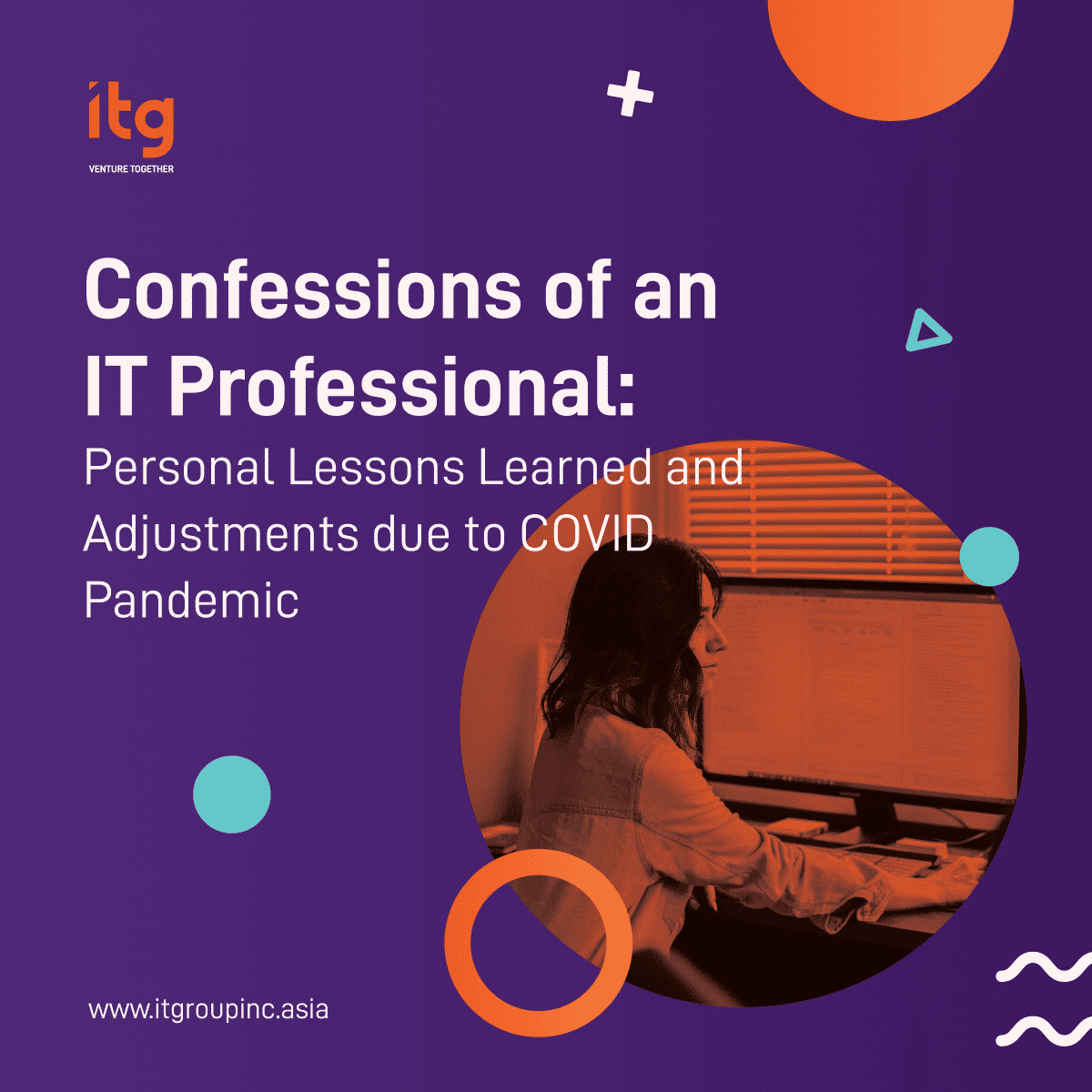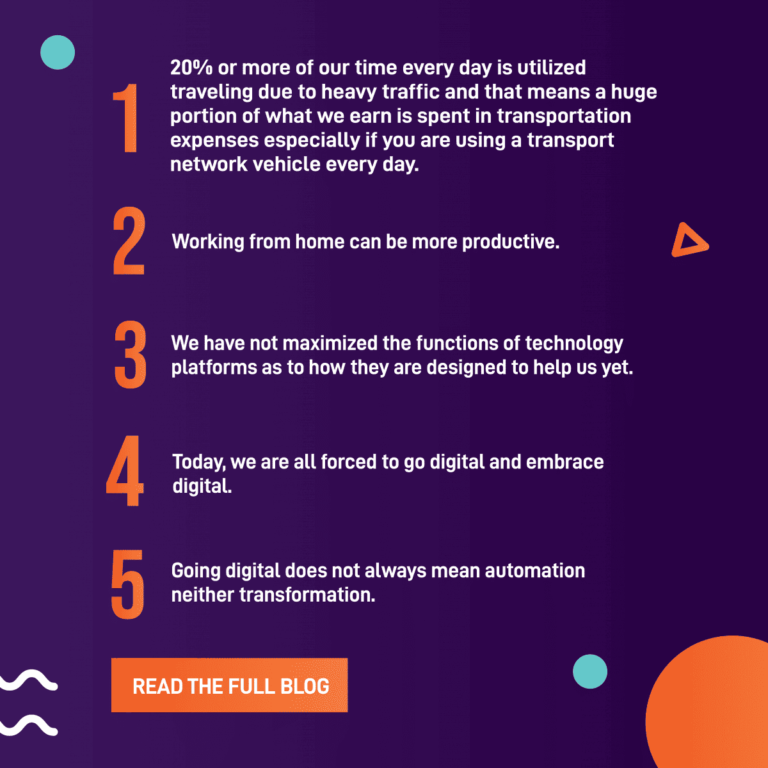
Confessions of an IT Professional: Personal Lessons Learned and Adjustments due to COVID pandemic
Author: Rubie Grace Casana-Villamor
- I am an IT professional, exposed and preaching to the world to embrace going digital but, I want things personal.
- I prefer face-to-face conversations and interactions for me to speak up.
- I would rather call than send SMS to convey a short message.
- I find it a waste of time explaining on chat.
- I live in the city but my family loves long drives on a weekend just to breathe in the fresh air, climb mountains, enjoy the beach or just walk on the field of greens.
- I have been using online banking services and making purchases online for several years now, but what makes me a loyal customer is the in-store experience and the exceptional service provided by staff in a brick and mortar store.
- I have considered working from home in the past but did not push through because I enjoy conducting training, meeting, and talking to customers and partners. Back then, I also found myself less productive when I’m at home.
- I have been attending webinars and conferences online in the past but nothing compares to the learning experience and the built camaraderie that live events offers.
The realities stated above gave me difficulty in adjusting to the “new normal” caused by the lockdown due to the COVID-19 pandemic. I found myself crying, exhausted, and worried out of little things every end of the day working from home. I had sleepless nights from all these emotions. Aside from speaking to a good friend, meditation in the word of God, and constantly praying, we started growing edible plants in our 1×1 meter drying cage in the place where we live and landed in the Philippine Urban Gardening (PUG) Facebook community. That changed my daily routine and added the color “green” in our lockdown experience.
Allow me to share the lessons learned we had to respond, survive and recover from the pandemic.
- 20% or more of our time every day is utilized traveling due to heavy traffic and that means a huge portion of what we earn is spent in transportation expenses especially if you are using a transport network vehicle every day. The money we saved from transport was enough to buy some long overdue appliances and furniture that we need for home improvement, added more food on the table and increased our savings and giving. The time saved from traveling has become valuable bonding moments and longer playtime with my son. Hence, he does not disturb me a lot while working because he simply knows that when I turn off my laptop, we can start building airport, cities and railway with his Jenga and Lego blocks.
- Working from home can be more productive. One hour meeting (some days I got at least 5 meetings or more) and 15 minutes interval to the next then set aside 2 hours deep work and you will find yourself accomplishing more than in a physical office setup. (But honestly, I still miss the chats with my colleagues, tap on the backs in between just to have a breather after a tough meeting discussion.)
- We have not maximized the functions of technology platforms as to how they are designed to help us yet. Another confession, prior to COVID, I only use Facebook to post some significant events 2-3 times a week, video call with family and chat with some friends, occasionally buy stuff online and post some helpful content from pages and that’s all. So who would have thought that this crisis will lead us to a business venture called “MULA Edible Garden Hub” because we have seen the demand in the market of loam soil, seeds and other gardening materials? PUG on Facebook has more than 140 thousand members and to capture at least 2% of that could possibly give us 28,000 customers instantly. We set up a Facebook page, shared some edible garden content, found a loam soil supplier in PUG, ordered some seeds from our NetSuite customer in ITG, posted some products in the Facebook marketplace and the rest is history. These simple steps is only a tip of the iceberg utilizing Facebook as a technology platform, I have not even seriously tried understanding the page statistics, nor do paid ads but the page likes now starting to grow organically. I can now say that we are now part of what is now called the new normal “HomEconomy” where businesses are run at home.
- Today, we are all forced to go digital and embrace digital because while we need to remain socially distant, we have to continue living, remain connected, and the only way for businesses to survive. Continuing the MULA story, we take all orders online, accept 80% of the payment online, and fulfill the delivery applications using mobile and it’s working. MULA suddenly became a 24×7 edible garden supplies store which a physical garden shop cannot do and this is also now part of the new normal. Personally, I am now required to respond via chat and monitor my Facebook notification during my scheduled break time because that could be a potential customer. So I guess, I was able to somehow cope up in this area although sometimes I find inquiries sent 3 hours ago and I get to reply to them late at night which led me to the next point.
- Going digital does not always mean automation neither transformation. Yes, I have a digital store but all the order process remains “manual” . It just happened that it’s done via a digital platform. Buyer see the page or marketplace post, inquire about the price, ask 1,2,3 up to n questions, and go back after some time (an hour, a day or two) transfer money in the bank or GCash or request a COD. Same process goes with my supplier and I maintain a spreadsheet of every product, transaction, and so on that, if I miss updating, all the data needs to be retrieved in my Facebook messenger. Which means no reconciliation process is done yet. I call this “manually digital”. So ironic, but I think this is true to many businesses – both SMEs and large corporations. Going digital did not automate the process and did not drive business transformation.It only transferred a physical and manual process to another platform and in MULA’s case it’s Facebook. While we all rush to go digital to survive and ensure our cash flow, it’s important to consider our in our going digital action plans if it will truly transform how we operate and thrive rather than merely survive.
So today, I am now thinking of setting up an e-commerce site to automate the order process and hopefully transform this startup venture into how we envisioned it to be. I will be happy to share again my lessons learned in the future article.
Looking back, the lessons I have shared are personally valuable to me. From all of it, I hope you picked something too for your personal reflection. The impact of COVID-19 is not the same for everyone. It has changed some mindsets or perspectives. It changed the way we work and do business and has forced all of us to go digital. While we all wish to go back to the old normal because we miss the “personal experience and touch” (and we all pray that this pandemic will now come to past), I think the way of life that COVID-19 has forced as to adapt will now permanently become the “new normal”.

ITGCon Baguio 2025: Advancing Regional Innovation with Secure IT and Intelligent Solutions
ITGCon Baguio 2025: Advancing Regional Innovation with Secure IT and Intelligent Solutions July 10, ...
ITGCon Bataan 2025: Powering Progress, Protecting the Future
ITGCon Bataan 2025- Powering Progress, Protecting the Future June 26, 2025 | Balanga, Bataan As the ...
IT Group Inc. Launches New Managed SOC Powered by CYREBRO to Help Businesses Stay Ahead of Cyber Threats
IT Group Inc. Launches New Managed SOC Powered by CYREBRO to Help Businesses Stay Ahead of Cyber ...



